Acetylation of androgen receptor enhances coactivator binding and promotes prostate cancer cell growth
- PMID: 14612401
- PMCID: PMC262657
- DOI: 10.1128/MCB.23.23.8563-8575.2003
Acetylation of androgen receptor enhances coactivator binding and promotes prostate cancer cell growth
Abstract
Modification by acetylation occurs at epsilon-amino lysine residues of histones and transcription factors. Unlike phosphorylation, a direct link between transcription factor acetylation and cellular growth or apoptosis has not been established. We show that the nuclear androgen receptor (AR), a DNA-binding transcriptional regulator, is acetylated in vivo. The acetylation of the AR is induced by ligand dihydrotestosterone and by histone deacetylase (HDAC) inhibitors in living cells. Direct AR acetylation augmented p300 binding in vitro. Constructs mimicking neutral polar substitution acetylation (AR(K630Q), AR(K630T)) enhanced p300 binding and reduced N-CoR/HDAC/Smad3 corepressor binding, whereas charged residue substitution (AR(K630R)) reduced p300 binding and enhanced corepressor binding. The AR acetylation mimics promoted cell survival and growth of prostate cancer cells in soft agar and in nude mice and augmented transcription of a subset of growth control target gene promoters. Thus, transcription factor acetylation regulates coactivator/corepressor complex binding, altering expression of specific growth control genes to promote aberrant cellular growth in vivo.
Figures
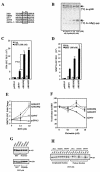
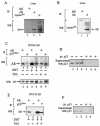
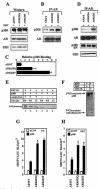
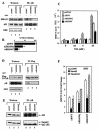
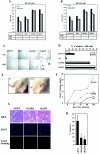


Similar articles
-
Androgen receptor acetylation governs trans activation and MEKK1-induced apoptosis without affecting in vitro sumoylation and trans-repression function.Mol Cell Biol. 2002 May;22(10):3373-88. doi: 10.1128/MCB.22.10.3373-3388.2002. Mol Cell Biol. 2002. PMID: 11971970 Free PMC article.
-
The androgen receptor acetylation site regulates cAMP and AKT but not ERK-induced activity.J Biol Chem. 2004 Jul 9;279(28):29436-49. doi: 10.1074/jbc.M313466200. Epub 2004 Apr 30. J Biol Chem. 2004. PMID: 15123687
-
p300 and p300/cAMP-response element-binding protein-associated factor acetylate the androgen receptor at sites governing hormone-dependent transactivation.J Biol Chem. 2000 Jul 7;275(27):20853-60. doi: 10.1074/jbc.M000660200. J Biol Chem. 2000. PMID: 10779504
-
Acetylation of nuclear receptors in cellular growth and apoptosis.Biochem Pharmacol. 2004 Sep 15;68(6):1199-208. doi: 10.1016/j.bcp.2004.05.037. Biochem Pharmacol. 2004. PMID: 15313417 Review.
-
Expression and function of androgen receptor coactivators in prostate cancer.J Steroid Biochem Mol Biol. 2004 Nov;92(4):265-71. doi: 10.1016/j.jsbmb.2004.10.003. Epub 2004 Dec 19. J Steroid Biochem Mol Biol. 2004. PMID: 15663989 Review.
Cited by
-
Evaluating the Cellular Roles of the Lysine Acetyltransferase Tip60 in Cancer: A Multi-Action Molecular Target for Precision Oncology.Cancers (Basel). 2024 Jul 27;16(15):2677. doi: 10.3390/cancers16152677. Cancers (Basel). 2024. PMID: 39123405 Free PMC article. Review.
-
Valeric acid acts as a novel HDAC3 inhibitor against prostate cancer.Med Oncol. 2022 Sep 29;39(12):213. doi: 10.1007/s12032-022-01814-9. Med Oncol. 2022. PMID: 36175803 Free PMC article.
-
The chicken ovalbumin upstream promoter-transcription factor II negatively regulates the transactivation of androgen receptor in prostate cancer cells.PLoS One. 2012;7(11):e49026. doi: 10.1371/journal.pone.0049026. Epub 2012 Nov 7. PLoS One. 2012. PMID: 23145053 Free PMC article.
-
Control of progesterone receptor transcriptional synergy by SUMOylation and deSUMOylation.BMC Mol Biol. 2012 Mar 22;13:10. doi: 10.1186/1471-2199-13-10. BMC Mol Biol. 2012. PMID: 22439847 Free PMC article.
-
Acetylation of estrogen receptor alpha by p300 at lysines 266 and 268 enhances the deoxyribonucleic acid binding and transactivation activities of the receptor.Mol Endocrinol. 2006 Jul;20(7):1479-93. doi: 10.1210/me.2005-0531. Epub 2006 Feb 23. Mol Endocrinol. 2006. PMID: 16497729 Free PMC article.
References
-
- Abate-Shen, C., and M. M. Shen. 2000. Molecular genetics of prostate cancer. Genes Dev. 14:2410-2434. - PubMed
-
- Alland, L., R. Muhle, H. J. Hou, J. Potes, L. Chin, N. Schreiber-Agus, and R. A. DePinho. 1997. Role for N-CoR and histone deacetylase in Sin3-mediated transcriptional repression. Nature 387:49-55. - PubMed
-
- Chen, D., H. Ma, H. Hong, S. S. Koh, S. M. Huang, B. T. Schurter, D. W. Aswad, and M. R. Stallcup. 1999. Regulation of transcription by a protein methyltransferase. Science 284:2174-2177. - PubMed
-
- Chen, J. D., and R. M. Evans. 1995. A transcriptional co-repressor that interacts with nuclear hormone receptors. Nature 377:454-457. - PubMed
Publication types
MeSH terms
Substances
Grants and funding
- R01 CA075503/CA/NCI NIH HHS/United States
- R01CA75503/CA/NCI NIH HHS/United States
- R01-CA65647/CA/NCI NIH HHS/United States
- R21 DK065220/DK/NIDDK NIH HHS/United States
- R03 AG2033/AG/NIA NIH HHS/United States
- P30 CA051008/CA/NCI NIH HHS/United States
- R01 CA070896/CA/NCI NIH HHS/United States
- P30 CA51008-13/CA/NCI NIH HHS/United States
- 1 R21DK065220-01/DK/NIDDK NIH HHS/United States
- R01 CA83979/CA/NCI NIH HHS/United States
- R01CA70896/CA/NCI NIH HHS/United States
- R01CA86072/CA/NCI NIH HHS/United States
- R01 CA086072/CA/NCI NIH HHS/United States
- R01 CA083979/CA/NCI NIH HHS/United States
LinkOut - more resources
Full Text Sources
Other Literature Sources
Medical
Molecular Biology Databases
Research Materials
Miscellaneous
